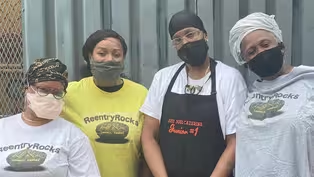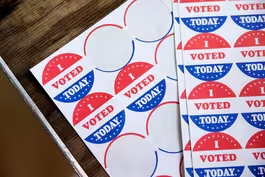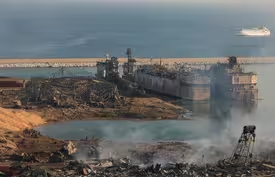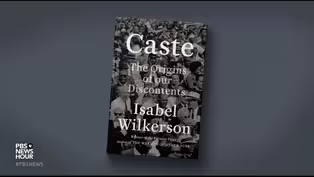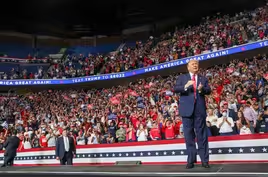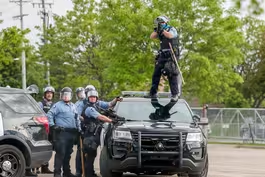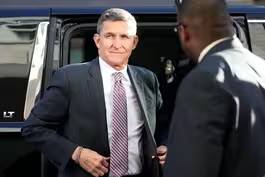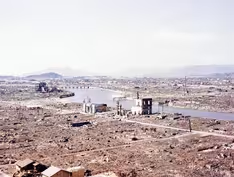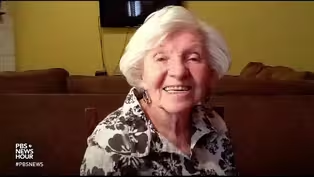
August 5, 2020 - PBS NewsHour full episode
8/5/2020 | 56m 44sVideo has Closed Captions
August 5, 2020 - PBS NewsHour full episode
August 5, 2020 - PBS NewsHour full episode
Problems playing video? | Closed Captioning Feedback
Problems playing video? | Closed Captioning Feedback
Major corporate funding for the PBS News Hour is provided by BDO, BNSF, Consumer Cellular, American Cruise Lines, and Raymond James. Funding for the PBS NewsHour Weekend is provided by...

August 5, 2020 - PBS NewsHour full episode
8/5/2020 | 56m 44sVideo has Closed Captions
August 5, 2020 - PBS NewsHour full episode
Problems playing video? | Closed Captioning Feedback
How to Watch PBS News Hour
PBS News Hour is available to stream on pbs.org and the free PBS App, available on iPhone, Apple TV, Android TV, Android smartphones, Amazon Fire TV, Amazon Fire Tablet, Roku, Samsung Smart TV, and Vizio.
Providing Support for PBS.org
Learn Moreabout PBS online sponsorshipJUDY WOODRUFF: Good evening.
I'm Judy Woodruff.
On the "NewsHour" tonight: the pandemic's impact.
As deaths mount at home and abroad, the Biden campaign announces he won't attend the Democratic Convention in person due to concerns over COVID-19.
Then: the aftermath.
Beirut takes stock of the damage wrought by a massive explosion, as the death toll rises and questions remain.
And defunding police.
The effort to reimagine public safety in Minneapolis faces hurdles, as the city sees spikes in violent crime and a deterioration of police-community relations.
JEREMIAH ELLISON, Minneapolis City Council Member: Right now, all we really have in terms of public safety is one system, and that's policing.
And people are going to be scared to create a new system of emergency response.
And I think it's going to take a lot of conversations.
JUDY WOODRUFF: All that and more on tonight's "PBS NewsHour."
(BREAK) JUDY WOODRUFF: New milestones tonight in the COVID-19 pandemic.
In public health, the world has topped 700,000 deaths.
In politics, Democrat Joe Biden has decided against accepting his presidential nomination at the party national's convention in Milwaukee.
And President Trump says that he might give his acceptance speech at the White House.
All of this comes amid a resurgence of the virus.
But, today, infectious disease expert Dr. Anthony Fauci dismissed talk of a new shutdown.
DR. ANTHONY FAUCI, NIAID Director: We can do much better without locking down.
And I think that that strange binary approach that either you lock down or you let it all fly, there's someplace in the middle when we can open the economy and still avoid these kind of surges that we're seeing.
JUDY WOODRUFF: Meanwhile, the White House and congressional Democrats negotiated again on a new economic relief package.
The president's chief of staff said that Mr. Trump may take executive action on unemployment benefits and eviction protection if there is no significant progress by Friday.
Our other major story is in Beirut, Lebanon, the aftermath of a cataclysmic explosion that killed at least 135 people and injured 5,000.
Special correspondent Jane Ferguson reported for us for years from Beirut, and has tonight's report on a city shattered.
JANE FERGUSON: It began with a fire at the port, and then an explosion so great, it created a mushroom cloud and a shockwave that roared through the entire city.
On the city's streets, everyday life was shattered.
A wedding photo shoot turns to disaster.
And a priest performing mass runs for safety.
WOMAN: Oh, my God.
Oh, my God.
JANE FERGUSON: Residents returning to their apartments found blasted-out windows and glass-covered streets.
Seventy-two-year-old janitor Boulos Touma was standing outside his apartment when the explosion threw him back inside.
BOULOS TOUMA, Beirut Resident (through translator): I saw my wife here covered in blood, hit on her head, on her ears.
My wife has high blood pressure.
Everyone was worrying about their own condition.
JANE FERGUSON: Beirut's hospitals, already overrun with coronavirus patients and partially destroyed, were flooded with the bloodied bodies of the walking wounded and those carried by others.
DR. SEEMA JILANI, Emergency Room Doctor: I just was shouting,"Is my daughter OK?"
I got to my apartment, which was unrecognizable, with no door, and I saw my daughter at the beginning had two gashes on her leg, and was naked and wrapped in a towel, with my husband applying pressure.
JANE FERGUSON: Dr. Seema Jilani is an emergency room doctor from Texas working in Beirut.
She spent the hospital ride singing to comfort her 4-year-old daughter.
DR. SEEMA JILANI: I have worked in areas of conflict like Iraq and Afghanistan and in Gaza.
What I saw yesterday was on the scale of that, if not more, in my particular personal experience.
I have never experienced something like this.
My ears are still ringing.
JANE FERGUSON: Lebanese security officials have said, nearly 3,000 tons of the fertilizer ammonium nitrate was stored in the port.
It's highly explosive and can be used for making improvised bombs.
It had been there for six years, after being confiscated from a ship, a level of mismanagement hard to comprehend.
Today, Lebanese President Michel Aoun visited the blast site.
In a speech later in the day, Aoun promised justice.
MICHEL AOUN, Lebanese President (through translator): We are determined to investigate and reveal what happened as soon as possible, to hand out punishment to those responsible.
JANE FERGUSON: The port is a lifeline for a city and a country already in the grip of an economic collapse, the result of years of corrupt leadership.
The large white buildings here, half-destroyed, are grain silos, holding the country's precious supplies of wheat, needed to provide subsidized bread to millions.
Lebanon's people have been struggling to buy food in the midst of currency collapse and hyperinflation.
Now, in a country where 50 percent of the population have slipped beneath the poverty line, the loss of grain supplies only adds to this catastrophe.
Panicked families are still desperately trying to find missing loved ones.
This Instagram account holds painful pleas for any information.
Many of these people worked at the port.
An entire team of firefighters that rushed to the initial blaze is missing.
For Dr. Jilani, she's grateful she has her daughter back in her arms, safe.
DR. SEEMA JILANI: The main thing is, she is out of the hospital, she is stable, she is not needing oxygen, and she is back to her feisty self.
So, the moments that you used to curse as a mother, those moments of tantrums, are joyful now, when you hear your child's cry.
It is a joy now.
JANE FERGUSON: The Lebanese people, so often described as resilient, have no choice but to live through yet another tragedy, and try to mend their homes and their lives.
For the "PBS NewsHour," I'm Jane Ferguson.
JUDY WOODRUFF: In the day's other news: Reports from South Korea say deadly explosions in North Korea killed or injured dozens of people on Monday near the Chinese border.
Video obtained by the Associated Press shows flames and black smoke firing into the sky amid loud bangs.
The reports say that propane gas cylinders may have exploded in a residential area.
In U.S. election news, progressive Democrats scored some key wins in Tuesday's primaries.
In Detroit, first-term Congresswoman Rashida Tlaib won renomination over City Council President Brenda Jones.
And in Missouri, Black Lives Matter activist Cori Bush beat longtime Congressman William Clacy Lay -- or Lacy Clay, that is.
We will talk with two political observers about what is on the mind of American voters after the news summary.
A former U.S. deputy attorney general denied today that President Obama and Vice President Biden tried to influence a probe of the Trump 2016 campaign.
It involved Michael Flynn, who became national security adviser, and his contacts with Russia during the Trump transition.
At a Senate hearing, Sally Yates said that Flynn was trying to neutralize sanctions against Russia.
She rejected claims that President Obama wanted to sabotage Mr. Trump.
SALLY YATES, U.S. Deputy Attorney General: Something like that would have set alarms from me.
And it would have stuck out both at the time and in my memory.
No such thing happened.
The president was focused entirely on the national security implications of sharing sensitive intelligence information with General Flynn during the transition, a process that was obviously already under way.
JUDY WOODRUFF: The Flynn probe later morphed into a full-blown investigation of Russian interference in the 2016 election.
The U.S. State Department's acting inspector general, Stephen Akard, has resigned.
Today's announcement gave no reason.
Akard's predecessor, Steven Linick, was fired less than three months ago.
Congressional Democrats allege that it's because Linick was investigating Secretary of State Mike Pompeo over claims that he had staffers perform personal errands.
Pompeo has denied it.
In India, Prime Minister Narendra Modi broke ground today for a Hindu temple, where a 16th century mosque once stood.
Hindu extremists tore down the mosque in Ayodhya in 1992, and 2,000 people died in the ensuing violence.
Today, worshipers danced in celebration, as Modi offered foundational stones for the temple.
It will be dedicated to the Hindu God Ram.
The remnants of Hurricane Isaias are now in Eastern Canada, after killing at least six people in the U.S.
The storm raked much of the East Coast, spawning tornadoes, downing trees and triggering flooding from North Carolina to New England.
More than three million homes and businesses lost power in the U.S. and Canada.
Wall Street advanced again today, partly on hopes for a pandemic relief package in Washington.
The Dow Jones industrial average gained 373 points to close at 27201.
The Nasdaq rose 57 points, and the S&P 500 added 21.
And legendary New York City columnist and author Pete Hamill died today at a Brooklyn hospital.
He'd suffered heart and kidney failure.
For decades, Hamill's storytelling captured the color and essence of the city, on everything from politics to civil rights to sports.
Pete Hamill was 85 years old.
Still to come on the "NewsHour": with the presidential nominating conventions just days away, we hear what voters in the heartland are saying in this election season; former Secretary of Defense William Perry on why the president shouldn't have the sole authority to order a nuclear strike; Minneapolis struggles as it tries to defund the police and reimagine public safety; and much more.
At a fund-raising event today, Joe Biden told supporters that he hoped his decision to forego an in-person appearance at the Democratic National Convention would set an example.
And I'm quoting: "From the start of the process, we have made it clear science matters."
He said: "The coronavirus has upended not only this presidential campaign season, but also millions of lives, in even the most rural parts of the country."
For more on how voters outside the Beltway are thinking about the pandemic and its political ramifications, I'm joined by Gary Abernathy.
He's in Hillsboro, Ohio.
He's a contributing columnist for The Washington Post.
And Sarah Smarsh, in Topeka, Kansas, she's a freelance journalist and author of the book "Heartland."
Welcome to both of you.
It's great to see you.
Let's start, Sarah Smarsh, by talking about, what is on the minds of voters you're hearing from?
The pandemic, the numbers were grim again today.
Over 1, 300 deaths were reported overnight, something like 53,000 new cases in one day.
But what are voters saying?
SARAH SMARSH, Freelance Journalist: Well, here in my state of Kansas, this is one of the states where new cases is on the uptick, unfortunately.
And in this region, just like across the country, I think it's certain that the pandemic is foremost on voters' minds.
That, of course, is sort of twin issue with the economy, the present state of which we can't separate from the public health crisis.
But, certainly, the pandemic and its ramifications is the talk on Main Street, as well as the stuff of local politics.
We have had here in Kansas, which has a split party control of state government, a lot of back-and-forth, basically, battles between a Democratic governor and a Republican legislature, Democratic mayors and Republican-leaning counties.
So it feels, I suspect, the way it feels in the rest of the country, which is like there's no federal leadership, and it's sort of a mess.
JUDY WOODRUFF: So, Gary Abernathy, what about where you are in, what is it, Southern Ohio?
GARY ABERNATHY, Columnist: Yes, Southern Ohio, Judy.
And thanks for having me on.
There may be a little different attitude here.
People are talking about the pandemic.
They take it seriously, but it's also an area where you're going to have a lot of people push back, worried about the violation of their constitutional rights.
There's been a lot of pushback in this area on mandates from Governor DeWine about mask and so on, that type of thing, which, again, people take it seriously, but they also think that constitutional liberties have maybe been not taken as seriously they could.
They don't like the idea they have been, you know, ordered not to go to work, been thrown out of work, the economy has been shut down.
So, I think people here, their attitude is, treat us like adults, give us the information we should have, tell us what the health experts say, and then let us decide for ourselves how to deal with it.
JUDY WOODRUFF: Sarah Smarsh, Kansas, are you hearing any of that conversation with -- the people you talk to?
And how much are they connecting what's going on to what's happening in Washington?
SARAH SMARSH: Sure.
Well, I think that, here, the controversy over whether, say, a mask is in order in these times certainly tracks along party lines.
What I would say, you know, if I go to a farmer's market or somewhere, a public place of commerce, this is a state where a governor attempted to make a statewide mandate, and then there was pushback from other jurisdictions.
And that was that sort of debate that I was referencing a moment ago.
So, at the moment, you know, local places are sort of at the mercy of their local government.
And what I would say is, for those who feel that a mask infringes upon their personal liberties in a way that outweighs their responsibility to their neighbors, that they are reliably conservative, and so that tells me that they are probably listening to messaging from Washington.
On the other hand, I would say that that's not the same thing as saying all conservatives refuse to wear a mask.
There's certainly been some, I think, kind of erosion of followship of the president, perhaps more for that reason.
JUDY WOODRUFF: And I want to pick up on that with you, Gary, in terms of the economy and how people are seeing what's happened to the economy, the loss of jobs.
To what extent do they connect it to decisions being made by President Trump, by Democrats?
GARY ABERNATHY: I think, again, keep in mind I'm in a part of the country that's very firm Trump country, so they see things in terms of maybe a little more of an effort of intentionally trying to hurt Trump through closing the economy.
A few months ago, everyone agreed that the biggest thing Trump had going for him was a strong economy.
And so the quick effort to kind of crash it, to turn it on its head, to throw people out of work is seen here by a lot of people, right or wrong, as an effort to hurt Trump.
So, there's a resistance to that.
On the other hand Judy, as has been reported elsewhere, in rural areas, we do see coronavirus cases rising.
So people are starting to notice, well, OK, you know, it's a real thing.
It's not just in the cities.
It's coming to the rural areas, too.
And I think the more that those numbers rise a little bit, a little less people will blame it all on a political effort.
JUDY WOODRUFF: And just finally to both of you.
Sarah Smarsh, we are getting closer to the conventions, to honest-to-goodness election season.
Joe Biden is staying put.
He's not going to his convention.
President Trump, apparently, isn't either.
What are people -- how much are they looking at the partisan divide right now and these two candidates?
SARAH SMARSH: Well, I can tell you that, in contrast to four years ago, during the election leading up to the 2016 casting of votes, I see fewer Trump signs, for whatever that's worth as a sort of qualitative measure along two-lane blacktop highways in rural Kansas, where I live, as well as in towns and cities.
That doesn't mean that folks have swung left necessarily.
I have seen a lot of signs for far right and certainly conservative-leaning candidates who are running for state offices or representatives offices.
We actually just had a primary yesterday.
JUDY WOODRUFF: Right.
SARAH SMARSH: And the Republican candidate for our open -- now open U.S. Senate seat, who was sort of favored by establishment Republicans over the more extremist Kris Kobach won, which is seen for a boon for Republicans in that race, against the Democrat, Barbara Bollier.
But, ultimately, I do feel like things have shifted away from embracing Trump since 2016.
JUDY WOODRUFF: How do you see, finally, Gary Abernathy, the Trump popularity and Joe Biden's presence now?
GARY ABERNATHY: Well, I'm sure Sarah's right about maybe where she's at in certain parts of the country, but, right here, the enthusiasm is unabated, the signs are up, and have been for quite a while.
The old "Make America Great Again" signs have been replaced by "Trump 2020" or "Keep America Great."
People are very anxious and motivated.
The enthusiasm level will be high here in Southern Ohio.
And I think the decision by Vice President Biden so far to kind of run, if he was in the White House, you would call it a Rose Garden strategy, can't last for too much longer.
I think the media will pressure him to come out more.
But, right now, in areas where I'm at, it's not doing him any favors.
JUDY WOODRUFF: Well, we shall see.
We're all watching all this with great interest, as you can imagine, as this very unusual election year unfolds.
Gary Abernathy, Sarah Smarsh, thank you both so much.
GARY ABERNATHY: Thank you.
Thank you, Judy.
JUDY WOODRUFF: Stuart Stevens is one of the Republican Party's most successful election campaign strategists.
His career spans decades.
And in his revealing new book,"It Was All a Lie: How the Republican Party Became Donald Trump," he admits the GOP has used race as an issue to divide Americans, in order to win elections.
And Stuart Stevens joins us now.
Thank you so much for talking with us.
The book is jarring.
I have to say, you write about how the Republican Party, over the last half-century, its hypocrisy, what you call self-delusion, led it naturally to embrace Donald Trump and to embrace what had been its racism.
Explain what you meant.
STUART STEVENS, Author,"It Was All a Lie: How the Republican Party Became Donald Trump": Well, I think there's been two strains in the party.
Call it an Eisenhower strain going back to the '50s and a McCarthy strain.
We look -- we think now of William Buckley as this intellectual soul of the Republican Party to a certain point, but -- which he was, but we forget that he began as a racist.
So there's always been this element.
Since 1964, the Republican Party has failed to attract large numbers of African Americans.
We used to acknowledge this as a failure and talk about how to try to change it.
Now we don't even hear any talk anymore of a big tent.
And we seem to have settled into a very comfortable white grievance identity.
JUDY WOODRUFF: And you acknowledge you yourself were part of.
You said, in your first race, you played the race card, so to speak.
There's a lot of blame to go around here, isn't there?
STUART STEVENS: Yes, I think it's really important - - at least it was for me, when I wrote the book -- not to blame others, but try to accept responsibility for it myself.
Personal responsibility was one of the key elements that drew me to the Republican Party.
And we have completely abandoned that, it seems.
Yes, in my first race, there was an African American independent and a white Republican and a white Democrat.
I made ads that were sort of like voter I.D.
ads, but they had the impact of informing African Americans that there was an African American in the race.
If you go back and you read the Pat Buchanan and Kevin Phillips memo that was written for Nixon which really outlined the Southern Strategy, the acknowledgment Republicans can't get African Americans, therefore, the need is either to suppress them or to divert them from the Democratic Party, has been at the core of Republican electoral strategy.
JUDY WOODRUFF: And you write about how that and how what you describe as the hypocrisy around family values -- and you do name names.
You talk about Newt Gingrich, Jerry Falwell, some of the evangelical leaders, and how all of this culminated in the easy acceptance of Donald Trump.
STUART STEVENS: Yes, I think that Donald Trump exposed these fault lines in the party, and made it impossible for a lot of us to deny.
It -- really, the party clearly doesn't believe in what it said it believed in.
I think that, you know, you go back a few years ago, we would have said there's a core set of beliefs, personal responsibility, character counts, strong on Russia, fiscal sanity, free trade, pro-legal immigration.
All of these were bedrock principles.
And now it's not that the party has drifted away from these.
The party is actively against each of these principles.
JUDY WOODRUFF: And, again, whether it's family values or, again, race, your point is that it comes down to some pretty ugly truths about the party that you say is some -- is an entity that can't be fixed.
STUART STEVENS: Yes, you know, I really have given up hoping that there's going to be some line that Donald Trump could cross.
Since I wrote this book, that has only been reaffirmed, be it race.
You know, the same weekend my home state of Mississippi finally took down the state flag, which is basically the Confederate Battle Flag, Donald Trump was defending the Confederate Flag.
He's out tweeting "White power."
He's tweeting about protecting the white suburbs.
And for the most part, the Republican Party is just silent or goes along with it.
I think that that's incredibly damning.
And Trumpism is deeply embedded in the party.
We -- and I don't think there's any way that's going to be changed in -- at least probably for a generation.
JUDY WOODRUFF: And so what happens now?
You and other Republicans who are dedicated to making sure Donald Trump is not reelected, you don't have a home in the party anymore.
Where do you go?
STUART STEVENS: You know, I think those of us who are working in these various projects to defeat Trump who are Republicans, I think each of us is going to have to come to grips with that and see what the world looks like on November 4.
For myself, Judy, I'm going to work with Democrats.
I think that the future of America, the policy is going to be decided by decisions inside the Democratic Party.
So, take health care for instance.
In 20 years, is America going to be the only country that doesn't have national health insurance?
No, we're not going to be that.
So, what that's going to be is not going to be decided in the Republican Party.
It will be decided in the Democratic Party, whether or not it's the AOC/Bernie Sanders wing or more of a Biden wing.
And I think the Republican Party has made itself largely irrelevant in those discussions by just saying no.
I'd like to be a part of what's going to happen.
JUDY WOODRUFF: What's going to happen, though, Stu Stevens, to the Republicans who have continued to support President Trump?
I mean, name Republican senators, Lindsey Graham, Mitch McConnell.
You could go down the list.
STUART STEVENS: Look, my feeling is that, really, Trump is George Wallace, and George Wallace actually did good things as governor.
He passed three textbooks.
But nobody is remembered as a free textbook George Wallace guy.
And I think Trump is going to be the same way.
I'm astounded that there's not more self-awareness of how Trump will be remembered, not in the long-term future, but even in the near future, and why there hasn't been more opposition to him, and why there hasn't just been more selfish realization that, if I don't stand up to Donald Trump, I'm going to go down as a Trump person.
But it hasn't happened, and they're very comfortable with Trump, obviously.
And that's how it's going to be remembered.
JUDY WOODRUFF: And what do you say finally, Stu Stevens, to those Republicans who have worked with you over the many, many years and say, he's a traitor to the cause, he's gone over to the other side, he's forgotten all the good things we did together?
STUART STEVENS: My feelings about this is very contradictory, because I really liked the people I worked for.
They're good people.
If they saw you stopped on the side of the road with a flat tire, they'd help you.
They would make good neighbors.
My feeling is that there's a collective failure here by the party.
Most of us goes through life -- at least, I know I certainly do -- trying to avoid moral tests.
But Donald Trump was a moral test that we couldn't avoid.
The party couldn't.
And we failed.
And I think it's particularly tragic, in that this generation of American politicians are heirs to the greatest generation.
And people like my dad spent three years in the South Pacific, 28 island landings.
And courage isn't standing up to Donald Trump.
Courage is getting out of a boat when the guy in front of you got shot.
And that was their legacy.
And I think that they betrayed that legacy by not standing up to the principles that they said that they were for.
JUDY WOODRUFF: Stuart Stevens.
The book is "It Was All a Lie: How the Republican Party Became Donald Trump."
Thank you so much for talking with us.
STUART STEVENS: Thank you, Judy.
JUDY WOODRUFF: On August 6, 1945, the United States dropped the first atomic weapon on Hiroshima, Japan.
In the coming days, we will examine this 75th anniversary, the bomb's immediate aftermath and its lasting legacy.
Today, Nick Schifrin looks at the president's sole authority to launch such a weapon and how that authority came to be.
HARRY TRUMAN, President of the United States: An American airplane dropped one bomb on Hiroshima.
NICK SCHIFRIN: Seventy-five years ago tomorrow, President Truman announced, the U.S. had harnessed the basic power of the universe.
The Manhattan Project took three years to successfully build and test an atomic bomb.
Throughout, Truman and his advisers called it the Gadget, thinking it was just another very big weapon.
NARRATOR: Even the thousands of men and women working on the project had no idea of the staggering energy they were to release.
NICK SCHIFRIN: Truman had actually delegated to the military when and where to launch.
On August 6, he believed only atomic bombs could end the war.
HARRY TRUMAN: If they do not now accept our terms, they may expect a rain of ruin from the air, the likes of which has never been seen on this Earth.
NICK SCHIFRIN: But after the Enola Gay flew over Hiroshima, and the mushroom cloud slowly darkened the sky, the devastation of the city was overwhelming and endless.
Survivors' hair was burned, their skin peeled off.
NARRATOR: A few days later, the second atomic terror was loosed on Nagasaki.
NICK SCHIFRIN: After that, Truman decided the decision to drop a third bomb could only be made by him.
Presidential sole authority was born.
JOHN F. KENNEDY, President of the United States: The purpose of these bases can be none other than to provide a nuclear strike capability against the Western Hemisphere.
NICK SCHIFRIN: In 1962, after the Cuban Missile Crisis, President Kennedy wanted to tighten nuclear control, so a briefcase with launch codes started traveling with the president.
Today, that so-called football is the symbol of the president's sole authority to launch.
DONALD TRUMP, President of the United States: They will be met with fire and fury, like the world has never seen.
NICK SCHIFRIN: President Trump is the first president in more than 40 years to have his sole authority questioned openly by Congress.
SEN. EDWARD MARKEY (D-MA): Many Americans share my fear that the president's bombastic words could turn into nuclear reality.
NICK SCHIFRIN: And sole authority is the subject of a new book,"The Button: The New Nuclear Arms Race From Truman to Trump," by former Secretary William Perry.
Secretary Perry, welcome back to the "NewsHour."
Let's begin with this fundamental question.
Is the threat of nuclear annihilation a distant one?
WILLIAM PERRY, Former U.S. Secretary of Defense: Well, we can be thankful that we have gone 75 years since Hiroshima and Nagasaki without launching the bomb.
But I believe the likelihood of it being used now, of breaking that record, is higher today than it was any time during the Cold War, that is, the danger of a nuclear catastrophe today is equal to the darkest days of the Cold War.
And most of the public simply do not understand that reality.
NICK SCHIFRIN: There are many checks in the system that you write about, preventing an unintentional launch, preventing an unauthorized launch.
But is there any way to prevent a determined president from launching a nuclear weapon?
WILLIAM PERRY: If a president decides to launch, he has the authority to do it, he has the equipment to do it, and, if it goes, there's no way of calling it back and there's no way of just destroying it in flight.
It would be an unprecedented catastrophe, far greater than World War II.
NICK SCHIFRIN: And that's, of course, the context for the main proposition that you have in the book, that the president should not have the sole authority to launch.
Why is that?
WILLIAM PERRY: There is a likelihood of a nuclear catastrophe today, but that's not because we expect Russia to be making an attack on us.
That's not going to happen.
Their leaders are not suicidal.
Deterrence really does work.
It could happen by a political miscalculation by the president, a false alarm.
Or it could happen because of a lack of sanity on the part of either the American president or the Russian president.
All of those things -- none of them is likely, but even if it's only one in 100, these odds are not good, when you consider the other end of the odds would be the end of our civilization.
NICK SCHIFRIN: The main argument, of course, for having nuclear weapons at the ready and having the president as the sole authority to launch is the requirement to respond quickly.
As you write, Russian nuclear weapons hypothetically could be launched and land inside the United States within 30 minutes.
Doesn't the president need to be able to respond quickly?
WILLIAM PERRY: The reason we thought we needed a quick launch was because we believed that we were going to get a surprise attack, originally from the Soviet Union, today from Russia, and we wanted to launch our ICBMs before that attack landed and destroyed our ICBMs is in their silos.
We have, however, at sea more than enough nuclear capability to respond to Russia.
And Russia knows that.
There is no hurry about ending civilization.
We should take time to consider that.
We can wait it out to ensure it really is an attack before we respond.
The best way of ensuring that is to give us enough time to consider what's happening, bring in other people for consultation, technical consultation and political consultation, before a launch is ever made.
NICK SCHIFRIN: I want to ask about whether this is about the current inhabitant in the White House.
You write that, for Donald Trump, starting a nuclear war is as easy as sending a tweet.
How much of what you're arguing here is about Donald Trump personally, whom you call impulsive?
WILLIAM PERRY: I believe that no person, no president should have that authority solely by himself, without consultation, without taking time in deliberation.
We have in the past President Kennedy, when he was taking heavy medications, and that could have clouded his judgment.
We had Richard Nixon, who was, in the last few months of his office, drinking heavily.
And that could have clouded his judgment.
Even Ronald Reagan, the last few months he was in the White House, was in the early stages of Alzheimer's.
So, there is no reason that we have to give this authority to one person.
And we should make every effort then to bring as many -- bring other people into the decision, and slow down the decision process, no quick launch.
NICK SCHIFRIN: The other main change you advocate in the book, Mr. Secretary, is that the U.S. cannot launch on the warning of an attack, that is, before an attack is unambiguously confirmed.
Why is that?
WILLIAM PERRY: Because we have had false alarms in the past, three of them that I'm historically aware of.
And if a president responds to an alarm, and it turns out to be false, there is nothing he can do to recall the missiles.
So, he will have started a nuclear war by accident.
NICK SCHIFRIN: And lastly, Mr. Secretary, if I could ask you, you were a soldier who helped occupy Japan and saw the aftermath of a nuclear weapon.
You have, of course, seen and been through a lot in those decades since.
But how much of your argument today is grounded on what you saw back in the 1940s?
WILLIAM PERRY: I saw, first of all, the devastation in Tokyo.
And then I saw Hiroshima and Nagasaki.
It was one bomb, one airplane in an instant.
If it's a nuclear war, not just a city can be destroyed in an instant, but a whole civilization.
Ronald Reagan and Gorbachev said it best, which is, a nuclear war cannot be won and must never be fought.
NICK SCHIFRIN: Former Secretary William Perry, thank you very much.
WILLIAM PERRY: You're very welcome.
Thank you.
JUDY WOODRUFF: Now, an effort -- an update on efforts to defund the police in Minneapolis, where the killing of George Floyd prompted calls for change.
Tonight, the city's charter commission will decide whether to ask voters to weigh in on this issue.
Special correspondent Fred de Sam Lazaro has our FRED DE SAM LAZARO: They are called the Minnesota Freedom Fighters, an openly armed, mostly black citizens group that in recent weeks has provided what they call an added layer of security to the community through a particularly difficult time, says Tyrone Hartwell.
TYRONE HARTWELL, Minnesota Freedom Fighters: We're tired of waking up looking at the news or looking at another Facebook video with another person of my skin tone shot down, strangled, whatever they -- is the issue, because a lack of understanding.
FRED DE SAM LAZARO: They came together soon after the uprising that followed events at a once-nondescript street corner that is now named George Floyd Square, a growing shrine with artwork and tributes to Floyd and dozens of others killed in police encounters across the country.
It is also ground zero for a campaign to abolish the Minneapolis Police Department by defunding it.
Proponents of defunding the police, including a majority of the City Council, say Minneapolis has been here before.
Several black men have been killed at the hands of police.
There was talk of reform, and then nothing happened.
They say it's time for the city to start over from scratch and reimagine public safety.
JEREMIAH ELLISON, Minneapolis City Council Member: Policing, as a concept, has had a complete monopoly on public safety.
FRED DE SAM LAZARO: And City Council member Jeremiah Ellison says it's been a failure.
JEREMIAH ELLISON: And I don't just mean a failure because it has perpetuated the kind of harm that you see in police killings and things that fall well short of police killings that still constitute harm.
But it also fails to keep people safe proactively.
FRED DE SAM LAZARO: The council wants to amend the city charter, which now requires a police force with a minimum staffing level.
That requires voter approval.
Among those opposing the move is Mayor Jacob Frey.
He says the council hasn't provided any alternative plan.
JACOB FREY (D), Mayor of Minneapolis, Minnesota: We have all this anger and frustration and sadness and all of this energy.
And it's our obligation to channel that energy and harness it towards something that is specific and productive, not vague and ambiguous.
FRED DE SAM LAZARO: Amid the debate over the policing, Minneapolis has seen both a spike in violent crime and a record number of complaints against the department since the city erupted in protests after Floyd's killing, protests that resulted in a police precinct being burned, after officers were ordered to evacuate.
SGT.
RICH WALKER, Minneapolis Police Department: Our morale has never been lower.
They're scared to death to answer calls, in case something turns violent, because they're actively trying to send us to prison.
FRED DE SAM LAZARO: Sergeant Rich Walker, who worked at the precinct, told a Minnesota Senate committee that as many as 200 officers, about a quarter of the entire force, may soon depart.
A number have filed disability claims.
SGT.
RICH WALKER: I have never been more broken as a police officer than I was to watch our leaders give up on our home.
And the truth is, the leaders of Minneapolis failed Minneapolis.
FRED DE SAM LAZARO: Mayor Frey says he has no second thoughts about his decision to abandon the precinct.
JACOB FREY: We only had about 15 to 20 officers inside, with almost nothing to defend themselves with other than guns.
Imagine what would have happened if they had continued to fight.
There was hand-to-hand combat and likely a scenario of death.
FRED DE SAM LAZARO: So, what now, when you have almost a quarter of the police force in some form of absentee situation?
I mean, that sounds like a significant staffing shortage.
JACOB FREY: We do have a staffing shortage right now.
And I disagree with the notion that we should be abolishing the police department.
Our officers are dealing with some very difficult situations.
FRED DE SAM LAZARO: Or they're not, according to many complaints.
Ebony Chambers describes a recent incident outside her home in Minneapolis' largely black Northside.
EBONY CHAMBERS, Community Activist, ISAIAH: There was about four teenagers walking down the middle of my street with guns out.
My neighbor stood up to them, which I don't know why he did.
But he said: "You guys need to please put the guns down.
I'm calling the police."
Called the police.
Never showed up.
Fifteen minutes later, we heard about 30 shots being shot off.
I don't know if the person they were shooting that lived or died or anything.
FRED DE SAM LAZARO: In another instance, she says police came to her door to tell her they'd given up chasing a suspect who had run through her backyard and, if she didn't like it, the officer said: EBONY CHAMBERS: "You need to contact your mayor, so that we can do our job."
Chambers and Donald Crumbley are part of a larger community organization called ISAIAH.
They say they're open to new ideas about public safety.
DONALD CRUMBLEY, Community Activist, ISAIAH: It's not about police and bad police.
We're past that.
It's about right and wrong.
And the community has to step up now, because we have received enough injustice.
FRED DE SAM LAZARO: But Lisa Clemons, a former police officer who founded a community group called A Mother's Love, says the City Council's actions haven't helped matters.
She says they have only emboldened criminals.
LISA CLEMONS, Former Minneapolis Police Officer: When the City Council came out with their statement of abolishing and dismantling and disbanding the police department, those incendiary terms, I think it created a lot of fear in the community.
But it also at the same time created a brazen attitude.
I think the community has been left to fend for themselves.
TYRONE HARTWELL: We're not trying to defend the police.
Again, we're not saying we don't need a police at all.
We're just saying that there needs to be a rebuilding of what they are.
You know what I'm saying?
JACOB FREY: We need a full culture shift in our police department.
Culture, to a certain extent, is about personnel.
It's about people.
So, right now, when the chief or I terminate or discipline an officer, as much as 50 percent of the time, that officer gets returned right back to the department from which they came because of an arbitration system.
JEREMIAH ELLISON: The mayor is going to have to recognize that, again, this is not a personnel problem, but a systems problem.
FRED DE SAM LAZARO: Councilman Ellison says the powerful police union would never concede on arbitration or other changes.
What's needed, he says, is a complete revamp, moving funds into violence prevention, mental health care and fixing other underlying causes of crime.
He admits it will be a culture shift of the larger community.
JEREMIAH ELLISON: And, right now, all we really have in terms of public safety is one system, and that's policing.
And people are going to be scared to create a new system of emergency response.
And I think it's going to take a lot of conversations.
FRED DE SAM LAZARO: The council's immediate hurdle is to get voters to approve a city charter amendment that would allow it to phase out the police department and phase in a broader office of public safety and violence prevention.
For the "PBS NewsHour," this is Fred de Sam Lazaro in Minneapolis.
JUDY WOODRUFF: The focus on Black Lives Matter remains, of course, one of the biggest subjects in the national conversation right now.
A new book looks at how hierarchy and class are very intertwined in the way race and racism plays out in America.
Jeffrey Brown talks to author Isabel Wilkerson.
It's part of our ongoing arts and culture coverage, Canvas.
JEFFREY BROWN: In 1959, Martin Luther King Jr., visiting India and seeing its caste system, realized he was a kind of untouchable in his own land.
It's one of many stories told in the new book "Caste: The Origins of Our Discontents," which asks us to see our country in a new way.
ISABEL WILKERSON, Author,"Caste: The Origins of our Discontents": I really was looking to better understand the very longstanding origins of divisions in our country.
You know, the era in which we live, this era of upheaval, really requires and calls for new language, new ways of seeing one another, new ways of understanding how we interconnect, and also what we have inherited as a country and as a people.
JEFFREY BROWN: Isabel Wilkerson is a former Pulitzer Prize-winning journalist with The New York Times, and author of "The Warmth of Other Suns," a history of the great migration of African Americans out of the South.
Working on that book, she came to see something deeply embed in American culture, even beyond race.
ISABEL WILKERSON: The word racism seemed inadequate to capture the full effect and full total experience of being in a world in which every single thing that you could and could not do was based upon what you look like, a world in which everyone was in some ways consigned to preconceived notions as to who should be where.
And people had to be careful to stay in their place, or it could mean their very lives.
JEFFREY BROWN: Wilkerson looks to India, where we're used to seeing caste, and to Germany, where the Nazis created a racial hierarchy that formalized persecution and, ultimately, genocide.
Drawing on the works of past anthropologists and historians, she reveals America's own insidious and artificial caste system, a strict hierarchy with rules that set in place both privilege and privation.
You write of caste as the -- quote -- "infrastructure of our divisions."
Now, in what ways does castes help us think about what's going on in American history and now?
ISABEL WILKERSON: The word caste is a reminder of an infrastructure beneath something that we -- something that's larger, something that sits beneath the foundation.
It is the foundation, the framework for how people interact with one another.
And so I have come to believe that caste, the infrastructure, the hierarchies that we often don't see, the bones of a thing.
I think of caste as the bones and race as the skin.
And that is the way to see that race is used or has been used historically as the cue, as the signal, as the indicator of where an individual fits in a preexisting hierarchy that had been created from a time of colonial era America.
JEFFREY BROWN: Slavery, from the beginning, manifests that hierarchy, one life worth more than another.
But Wilkerson sees a continuity, waves of European immigrants arriving in this country and, in a sense, learning they are white and, therefore, above those who aren't.
ISABEL WILKERSON: When you're in a caste system, a hierarchy, everyone is affected by it.
It's about the investment in the hierarchy, how one moves about in a hierarchy.
And the insidious thing about such a hierarchy is, it's something that we don't see, again, bones vs. skin.
You can see the skin.
You can see the outward manifestations, but you don't often see the unseen inputs and triggers and assumptions, the unconscious biases that pervade society, that are there below the surface of consciousness that have been ways that everyone has been socialized to know and recognize who is -- who is very likely to be in positions of power, who is likely to be poor, who is likely to be on the margins.
JEFFREY BROWN: Who is likely to sit in a position of power in the boardroom, who is likely to live in certain neighborhoods, who is likely to be stopped by police and treated with brutality, the focus of current Black Lives Matter protests.
ISABEL WILKERSON: American history is reflective of the ebbs and flows, progress and pushback, moving forward and then receding.
That's essentially the history of our country.
And so this is a moment, another moment that could be potentially a sea change.
I view it as being the cusp of an awakening, an awakening to a part of much, much of American history that many people may not have known.
The goal of this work is to allow us to see, again, the structure that we have inherited, to be able to push forward, but, most importantly, to recognize that we all have a stake in it, and to recognize that it will take each and every one of us to make it the strongest house possible.
JEFFREY BROWN: But I have to say that, in reading this, caste, as you describe it, seems even more fixed, in a sense, than race as a concept, as a structure.
Is it something that is fixable?
ISABEL WILKERSON: I would like to believe that it's fixable.
I wouldn't have written this if I didn't think that it was.
I have to remain hopeful.
I have to remain - - I have to believe that, once awakened to our history and to our current reality, as has occurred in recent months, that this would move all of us to want to bridge these divides, to find ways to scale the walls that have been built between us, and to recognize that these are false and artificial divisions.
These are manmade divisions.
And if they were made by man, then they can also be fixed by man.
JEFFREY BROWN: All right, the book is "Caste."
Isabel Wilkerson, thank you very much.
ISABEL WILKERSON: Thank you.
JUDY WOODRUFF: Throughout the pandemic, Americans in elder care homes have been some of the people most at risk from COVID-19.
But there are those in nursing homes who have survived the disease, despite their age.
Tonight's Brief But Spectacular features centenarian Grace Weissman Spiegel Davis, who shares what her experience was like.
GRACE WEISSMAN-SPIEGEL-DAVIS, Coronavirus Survivor: I was a victim of the coronavirus.
And I must say, I am happy that I survived this.
And I'm told I did come down with a fever.
Truthfully, I wasn't aware of it.
And it might be that I was not mentally facing it.
There has been no activity in the hairdressing salon because of this pandemic which is going on.
So I said, when I was asked to be interviewed, only if I can have my hair done.
And that's what happened.
I had my hair done, so I'm number one on the hit parade.
(LAUGHTER) GRACE WEISSMAN-SPIEGEL-DAVIS: I'm 102 years old, and I live in a retirement development called the Mary Wade Home, which is in New Haven, Connecticut.
As a little girl, we lived -- it was a tenement, actually, in Harlem, New York, on 116th Street.
I never heard of a pandemic before this one.
We had what we called epidemics, and one was whooping cough.
And I remember my mother taking us on the subway to the Staten Island Ferry during the whooping cough epidemic, because saltwater was good for the whooping cough.
I remember that very clearly.
Well, my life hasn't changed much, and I feel like I still can have some fun and a few laughs and still have my mental facilities or faculties, I should say.
(LAUGHTER) GRACE WEISSMAN-SPIEGEL-DAVIS: All I know is that I tell all my friends, if I die, please call my hairdresser first.
I want to have my hair done and look well at my funeral.
(LAUGHTER) GRACE WEISSMAN-SPIEGEL-DAVIS: I have led a nice life.
I have been very fortunate.
I would like to be remembered as a good friend, as a good relative, and as a good person who lived on this wonderful Earth, and hope that it all works out well.
My name is Grace Weissman-Spiegel-Davis.
And this was my not-so-brief, but spectacular life.
JUDY WOODRUFF: Grace Weissman-Spiegel-Davis, we are so glad you survived, and a lot of us share your appreciation for hairdressers.
And that's the "NewsHour" for tonight.
I'm Judy Woodruff.
For all of us at the "PBS NewsHour," thank you, please stay safe, and we'll see you soon.
Business owners with criminal records haunted by their past
Video has Closed Captions
Clip: 8/6/2020 | 7m 43s | During economic collapse, business owners with criminal records are haunted by their past (7m 43s)
2 views on what matters most to heartland voters
Video has Closed Captions
Clip: 8/5/2020 | 8m 40s | As pandemic upends presidential campaign, what issues matter most to voters (8m 40s)
Beirut blast means new suffering for a country in collapse
Video has Closed Captions
Clip: 8/5/2020 | 4m 28s | Beirut blast means more suffering for a country on the brink of collapse (4m 28s)
‘Caste' author Isabel Wilkerson on race, class hierarchy
Video has Closed Captions
Clip: 8/5/2020 | 6m 17s | ‘Caste' author Isabel Wilkerson on America's race and class hierarchy (6m 17s)
GOP strategist will 'work with Democrats' to defeat Trump
Video has Closed Captions
Clip: 8/5/2020 | 7m 59s | Longtime GOP strategist says he'll 'work with Democrats' to defeat Trump (7m 59s)
Minneapolis officials debate future of city's police force
Video has Closed Captions
Clip: 8/5/2020 | 7m 46s | Minneapolis officials grapple with question of police reform -- or replacement (7m 46s)
News Wrap: Sally Yates denies Obama influenced Russia probe
Video has Closed Captions
Clip: 8/5/2020 | 4m 36s | News Wrap: Former deputy AG denies Obama influenced Russia probe (4m 36s)
Should U.S. president be authorized to launch nuclear bomb?
Video has Closed Captions
Clip: 8/5/2020 | 7m 54s | 75 years after Hiroshima, should U.S. president have authority to launch nuclear attack? (7m 54s)
This nursing home resident survived COVID-19 -- at age 102
Video has Closed Captions
Clip: 8/5/2020 | 2m 59s | A centenarian's Brief But Spectacular take on surviving COVID-19 (2m 59s)
Providing Support for PBS.org
Learn Moreabout PBS online sponsorshipSupport for PBS provided by:
Major corporate funding for the PBS News Hour is provided by BDO, BNSF, Consumer Cellular, American Cruise Lines, and Raymond James. Funding for the PBS NewsHour Weekend is provided by...
